Although Stan was economically poor compared to most of the other kids at school, his mother dressed him smartly to cover for him as best she could. He became a clotheshorse for life at a young age. In a business built on image, this didn't hurt him at all. At 14, he worked the summer in the Catskills as a busboy, musician and shy emcee for shows. He hated talking before an audience.
In September of 1941 Stan was accepted into the All City High School Orchestra of New York City. Entrance into this select group gave him access to a private, free tutor from the New York Philharmonic, Simon Kovar - a bassoonist. He also began to play local gigs at this time: fraternity parties, bar mitzvahs, Saturday night dances. They paid about three bucks a night. At 14 he had saved enough to buy a tenor sax.
Four months into gigging, he met trumpeter Shorty Rogers on the bandstand one night. Stan knocked him out by playing famous jazz solos by Lester Young and Tex Beneke perfectly and reading charts flawlessly and fast. He started going to jam sessions after gigs ended. Getz later explained his gift: "It's like a language. You learn the alphabet, which are the scales. You learn the sentences, which are the chords, and then you talk extemporaneously with the horn. It's a wonderful thing to be able to speak extemporaneously, which is something I've never gotten the hang of. But musically, I love to talk off the top of my head. And that's what jazz music is all about."
Encouraged by older musicians in local bands who recognized his talent, Stan was hired by house bandleader Dick Rogers to play at Roseland for thirty-five dollars a week in December of 1942. His grades began to drop as he worked more, and soon Stan droped out of high school. The school system's truancy officers served bandleader Rogers with papers. Stan was sent back to the classroom, but by now it was pointless. Stan already knew what he wanted to do and how to make a living doing it. On January 14, 1943, he joined the Musician's Local 802 in New York. He told other musicians he's available to play now. A friend recommended famous trombone player Jack Teagarden's band. Stan hung out at the rehearsal hall and auditioned for the band. The war draft was draining a lot of bands, and Teagarden knew Stan was not draft age yet. Stan sat in, read the charts perfectly and was offered $70.00 a week. He was told to pack his things and be ready to leave with the band for Boston the next morning.
He returned home to the Bronx tenement expecting an argument about going on the road, but his mother was out and his Dad surprised him. "Go!" his father told him emphatically. "Christ! Stan, seventy bucks a week! I can't make that in two weeks. And I haven't had a job in a month anyway."
Leaving home, for the road...Stan began touring with the Teagarden band, but in St. Louis truant officers again caught up with him. Jack was told that if the kid was going to continue to work with him in the band, "T" must become his guardian in order to see that Stan completed his schoolwork once a week. Stan's parents agreed to the arrangement. "He [Teagarden] taught me a lot about bending my right elbow" - this was how Getz put it to a reporter later on. "In my early years, working with Jack Teagarden had the most effect on me. That was a very good introduction to professional music to me. Teagarden was a great musician. His playing is timeless - and it's logical." Working in the Teagarden band was tough. The one-nighters never ended.
By nature, Getz possessed an extremely addictive personality type. At 15 he took up smoking cigarettes at the rate of a pack a day for the rest of his life. He also discovered that alcohol helped lower his anxiety, so each night he was getting drunk. His male role models at this stage of his life were a father who had deferred to Stan's musical money making options and a famous guardian with a non-stop drinking habit. Stan appreciated the happiness soloing on his saxophone brought him. Soloing was like getting high, and he wanted to repeat the feeling each night on the stand.
Stan's days with the Teagarden band ended in 1944 when he was seventeen. The band was in California, and Stan wanted to stay there. The local union told him he could not work in a steady paying gig for 90 days. He took the only job of his life outside of music, selling men's clothes in a store. He played one-nighters to supplement this. He sent for his parents and brother to come out and join him, and they lived in one room.
Stan Kenton...
Thirty-three year old bandleader Stan Kenton hired Getz for $125.00 a week. Kenton worked with Bob Hope on his popular radio show, which reached 20 million listeners each Tuesday night. The Kenton band followed Hope around California playing at wartime troop bases. Kenton also had a steady gig at the Palladium Ballroom in Hollywood. On July 20, 1944, Stan played his first recording date with the band, and the first song they record became a big hit, "And Her Tears Flowed Like Wine", sung by Anita O'Day. It sold 400,000 copies and reached #4 on the charts.
There were several musicians in the Kenton band addicted to heroin. Taking note of how much Getz drank each night, one of them turned him on to heroin, snorting it in the back of the band bus. Within a few weeks Stan was addicted.
Working in Kenton's band, Getz carefully studied the work of his idol, Lester Young. He learned his solos note for note and began incorporating them into his Kenton work. It was over a disagreement about Young's relevance that Getz left Kenton in April of 1945, the same month President Roosevelt died and four months before the end of WWII.
Jimmy Dorsey, Benny Goodman, a record deal, and marriage...After a short stint with the easygoing Jimmy Dorsey, eighteen-year old Getz joined Benny Goodman's band in October of 1945. Between October and December of that year, Benny's band was based in a Newark, N.J. nightspot. Stan regularly went into New York and hung out at the Spotlite Club on 52nd Street to hear Charlie Parker perform. At this time he also met Beverly Byrne, a vocalist with Gene Krupa's band, and a sister of the then famous vocalist Buddy Stewart. Someone at Savoy Records noticed Stan and signed him to lead a recording session. For his first gig as a leader, he formed a "Swing Bop Quartet" and recorded four tunes with pianist Hank Jones, bassist Curly Russell and drummer Max Roach. The titles were: "Opus De Bop," "Running Water", "Don't Worry 'Bout Me" and "And The Angels Swing".
Stan and Beverly were married on November 7, 1946 in Los Angeles. There Stan would hang with a certain group of saxophone players in L.A., all influenced strongly by Lester Young. They're playing in the rehearsal band of trumpeter Tommy DeCarlo. They are: Herb Steward, Zoot Sims and Jimmy Giuffre. The band often played an East L.A. Mexican ballroom playing mainly Mexican stock arrangements. Sometimes they would mix in their own jazz and no one seemed to mind.
Ralph Burns came down to the joint to hear his friends play one night and was blown away by the cohesion of the saxophone team. Burns at that time was the staff arranger building Woody Herman's new Bop-based band, and Woody hired all four of the saxophone players on Burn's advice. The organization was to be known as Herman's Second Herd. His first band had been more swing and blues oriented. "From the very beginning that band was something special," said Stan many years later. "I remember our first rehearsal at a place on Santa Monica Blvd. Ralph Burns came in with a brand new, pretty difficult chart...and that band read it down and swung it without a moment's hesitation."
Between December 22-31,1946, this band recorded fourteen songs, releasing eleven of them. Five of these eleven became hit singles: "I've Got News For You", "Keen and Peachy", "The Goof and I", "Four Brothers" (named after the saxophone players of Stan Getz, Serge Chaloff, Zoot Sims and Herb Steward) and "Summer Sequence". All of Stan's influences are at play in his work by now: Notably Lester Young, Charlie Parker, and Dexter Gordon.
Development..."I never consciously tried to conceive of what my sound should be...I believe it was because of the bands I played with from the ages of 15 to 22. The first one was Jack Teagarden, who we all know played trombone, but his sound was so great...so legitimate, and effortless. I never tried to imitate anybody, but when you love somebody's music, you're influenced. Then I was with Benny Goodman when I was 18, and I believe his sound had an influence on me; such a good sound that he had in those days, you know? And in-between I heard Lester Young, of course, and it was a special kind of trip to hear someone like Lester, who sounded so good and almost classical in a warm way. He took so much 'reed' out of the sound. I really don't know how I developed my sound, but it comes from a combination of my musical conception and no doubt the basic shape of the oral cavity. I did always try to get as much of the reed out of the sound as I could... and hear more of the breath. I came from an era when we didn't use electronic instruments. The bass wasn't even amplified. The sound was the sound that you got, and I discovered that my dark sound could be heard across a room clearer than somebody with a reedy sound...I have to work hard to get my sound because I use a harder reed (med-hard Van Doren). People think that I play effortlessly. I remember doing a record date with Bill Evans and afterwards he said to me, you make it sound so easy but when I get right up next to you you're working hard and making it sound easy!"
Heroin use was out of control in the Herman band. Stan: "I remember playing one time with Woody's band at this afternoon concert. Nine acts of vaudeville and a trained bear. The bear came on, and I mean, this bear had to be nine feet tall. And the band came out, and the two on each side of Sam Marowitz-the lead alto player who was very strait-laced; no drugs, no drinking-were Serge Chaloff, Zoot Sims, Al Cohn and me. All stoned. The bear was doing this thing with the trainer, and at one point the bear came around and his arm went over the saxophone section. He could have killed the five of us- but only Sam Marowitz ducked. The rest of us were too stoned to even know the bear was near us."
The vocalists were top draws after the war, not bands. Record companies didn't understand and appreciate the significance of bebop. Television, cars and suburban living were spreading the nightclub and dance hall customers further away from the centrally located club venues. Woody Herman pointed out another division: "The audience that could understand 'Apple Honey' couldn't relate to 'Lemon Drop', or 'Four Brothers'. Musically, the bebop route was magnificent, but business-wise, it was the dumbest thing I ever did."
Between several damaging "recording bans" instituted during the 1940's by the American Federation of Musicians for union bargaining, bands squeezed in as many recording dates as they could. On one of these rushed sessions, Herman recorded "Early Autumn", featuring a brief, beautifully stated solo by Getz. The record became a hit when it was released a few months later. Although Getz was never interested in listening to his own records, he once said, "'Early Autumn' I've heard, because it's played on the radio enough for me to hear it. And it's okay. It's a nice solo. But I don't get it. I don't understand why it was such an earth-shaking thing. It's just another ballad solo for me... my music is something that's done and forgotten about."
Stan quit the Herman band in March 1950 after a tragic accident on a train outside Chicago. Stan and several other musicians had been driving to a gig in winter conditions when their car broke down. The Herman band manager had arranged to flag down a train in an out-of-the way town to pick them to continue their trip. When the train slowed unexpectedly, an old conductor - a month from retirement - got down onto the tracks to investigate. He slipped under the wheels of the train on some snow and was killed. As the happy musicians boarded one of the warm cars, other passengers, who had already heard what had happened to the conductor, greeted them with icy, angry stares. Stan never forgot the tragedy - it freaked him out so much he quit the band. He began to freelance, cutting a few records, and led a big band for the only time in his life at Harlem's Apollo Theater for one week in August of 1950.
Success...The previous month (July, 1950) Woody Herman's record of "Early Autumn" had been released, and the more airplay it got, the bigger the Getz name became. Stan was now officially a star, based on one solo, and everyone wanted to hear him play.
Beverly and Stan suddenly had enough money to buy a modest house in Levittown, New York, and by Dec.15, 1950 Stan Getz is recognized enough to be asked to open "Birdland" with Charlie Parker and Lester Young. He is 22. On Christmas day, 1950 he joins an all-star concert at Carnegie Hall featuring Miles Davis, Serge Chaloff, Sonny Stitt, Max Roach, Bud Powell, Parker, Sarah Vaughan and Lenny Tristano. He tops the Metronome Magazine Poll as Tenor saxophonist, and shares the Metronome Musician of the Year Award with Lee Konitz. He comes in second in the Downbeat Poll.
While playing a gig in Hartford, Connecticut, Stan hires a local kid named Horace Silver to join his group on piano,
("I was discovered in Hartford, Connecticut by Stan Getz and took Al's place. In 1950 I was about 21. I was appearing at The Sundown with Harold Holdt. Stan liked me, hired me and I took Al's chair to go on tour with Stan's quintet." -
Horace Silver) and then he was off to perform in Sweden, where he received a hero's welcome. Everything was fine until he discovered there was no heroin anywhere to be found. He suffered through withdrawal and played as much as he could with young Swedish players his own age, who knew little about the prevalence of narcotics on the American jazz scene. Being exposed for the first time in his life to very talented, enthusiastic musicians who weren't high on drugs causes a rather short, first epiphany for Stan. He wanted to be clean like them. He hoped he could quit using soon.
Recording constantly, regardless...Back in Boston in October of 1951, he recorded Live at Storyville Vol. 1 and 2 at George Wein's Boston club. The gig, recorded on October 28th, was an amazing performance by Getz, and featured Al Haig on piano, Jimmy Raney on guitar and Tiny Kahn on drums. They sped through thirteen tunes in sixty-seven minutes, including the spectacular tribute "Parker 51".
On March 11, 1952 Stan recored "Moonlight in Vermont" and his audience grew. He was making $1,000 a week, and spending almost all of it on heroin. His wife Beverly was also addicted, and they made frequent six hour round trips between Long Island and Philadelphia to score cheap junk. He was keeping his career going in spite of his habit, and some great sides kept his audience growing. To mention only a few: "These Foolish Things Remind Me Of You", "Stella by Starlight" and "Thanks For The Memory", performed with the Jimmy Raney.
Norman Granz...Stan signed with Norman Granz's Clef Records label in 1952, and Granz turned on the P.R. machine to sell Stan. He combined several 78 singles into an LP album entitled Stan Getz Plays, packaged with a memorable cover shot of Stan leaning forward with his saxophone to receive a kiss from his young son Steve in the recording studio. Granz put him on tour with a Jazz At The Philharmonic company, and things were great until he got busted in a Los Angeles narcotics sweep. He was arraigned, but the judge let him finish his pre-arranged eight-day tour with west coast producer Gene Norman and pianist George Shearing. Stan fronted a sax unit on the trip featuring Zoot Sims and Wardell Gray.
Problems...He had been on heroin for nine years, and wanted to get off of it before he went to prison. While on this tour he swallowed barbiturates and drinks liberally to lessen the inevitable withdrawal symptoms. He was strung out during the entire tour and tried to pick fights with other musicians on the bus. By the time they arrive in Seattle, he was in misery with muscle cramps. Gaunt and sickly, he walked into a drug store across the street from his hotel, pretended he had a gun under his coat and staged a stick-up. A woman named Mary Brewster was behind the counter that morning, and when Stan approached he tells her, "Give me a capsule of Morphine. Don't scream. If you don't, I'll blow your brains out." She calmly assists two other customers, and whispered, "Stick up," to one of them who left quietly and called the police. Turning back to Stan, she said, "Let me see your gun."
At this unexpected challenge, Stan turned and ran out of the store and back to his hotel room across the street as the other customers watched. He then called to apologize to Mary Brewster. A cop was already there and listened in on another phone. Stan said, "I'm sorry for the crazy thing I did. I've never done anything like that before. I'm not a stick-up man. I'm from a good family. I'm going to commit myself on Wednesday." Brewster asks "Why don't you commit yourself today?" "I can't. If I don't get drugs, I'll kill."
The cop on the phone spoke up, pretending to be a doctor and asked if he can help. Stan blurted out his life's story. The "doctor" said he was coming right over to help. Locked in his room, despairing and ashamed, Stan tried to kill himself by swallowing a fistful of barbiturates. The police knocked on his door minutes later, and run him in for booking. A photograph of Stan in the back seat of a patrol car, looking sick and scared, was flashed over the news wire services. The overdose of barbiturates took effect minutes after he was locked up and he collapsed. He was rushed to a hospital where doctors perform an emergency tracheotomy to save his life.
All of the national attention brought reporters to his bedside the next day. He explained that he began getting hooked on heroin "about a year ago." He told them about his family life with Beverly and the kids, and how there was another baby on the way. He talked about how he sent his parents money to live on back in New York. He painted a picture of a loving family man who had made some terrible mistakes. He didn't mention that his wife is also a heroin addict. He was released from the hospital for sentencing in the previous Los Angeles narcotics case.
The sentencing judge wasn't buying Stan's own damage control story. He got right to the point:
"You have talent, family and a good background, but despite an income of a thousand dollars a week, you are not only broke, but your family is living under deplorable conditions. They are sleeping on the floor while you travel in luxury spending money on yourself - and doing what comes naturally.
You're a poor excuse for a man. If you can't behave yourself, someone else is going to have to look after you... It's time you grew up." Stan was sentenced to six months in jail and three years probation. He was lucky to be sent to the jail ward of the Los Angeles General Hospital where he began detox. At the same time he was admitted, his addicted wife was downstairs giving birth to their daughter, Beverly.
Stan was transferred to the Los Angeles City Jail, which was a much tougher place. He was released exactly six months to the day later on August 16. For the first time in his adult life he was drug and alcohol free. He was 27.
Staying on top...Within thirty-six hours of his release, he was in the best and worst place he could possibly be - performing on stage with Chet Baker in Los Angeles. Only three days later he was playing an All-Star concert before another California crowd of 6,000 and received a thunderous ovation when he arrived onstage. Norman Granz put him on tour with the band of Duke Ellington. Dave Brubeck and Gerry Mulligan filled out the bill. In December of 1955 he was the featured guest soloist with the Count Basie Band. To round out the year, he won the Downbeat Poll for the fifth straight time.
While playing a Washington, D.C. club date he met a 19-year-old Swedish aristocrat named Monica Silfverskiold backstage. She was studying at Georgetown and was attending the gig with friends. Back out west alone with the kids, Beverly was nearly strangled to death by an escaped mental patient while she walked with her two small boys near her home one morning in Laurel Canyon. The two boy's screams for help were heard by nearby police as they ran down the trail in panic, and the cops captured the patient.
Stan decided to move the family back east, and he arranged for Beverly and the kids to drive back as far as Kansas City with one of her reputed connections named Tom Killough. They were to meet Stan in K.C., and he was to drive the rest of the way to New York. Near Tulsa, Okalahoma, Killough fell asleep at the wheel and the car was split in two by the steel I-beam of a turnpike overpass. Killough dies. Beverly and the children are in very serious condition.
Stan flew unannounced to Sweden in the autumn. Once again he went through heroin withdrawal, this time ending up in a strait jacket in the hospital. He came down with pneumonia and nearly died. Monica felt that God had given her a perfect life so far and had sent Stan so that she could help him. "Love will conquer all", she hopep, and she made it her mission in life to take care of him.
Her wealthy family sent them off to Africa so that he could recuperate without drugs interfering. They returned to Sweden where they were engaged to be married, and then they returned to the U.S.
Stan took off for a JATP tour and got a Mexican divorce. Stan and Monica moved to Great Neck, Long Island. Beverly settled for a lump sum cash payment. He continued to work steadily for Norman Granz, recording "Stan Getz with Oscar Peterson", "Mulligan Meets Getz" and "Stan Meets Chet". He won the Downbeat and Metronome Polls for the 8th and 9th time and was a featured performer at the Brussels World's Fair in 1958. Soon Monica flew home to Sweden to give birth to their first child. Tired of the IRS hounding him, Stan decided to move to Denmark. He paid off the IRS by mail. Denmark was relaxing for Stan. Stan and Monica rented a villa and settled in with the new baby and the other children. The villa was in a small town outside of Copenhagen called Kungens Lyngby and faced a swan-filled pond.
Stan joined Anders Dyrup in starting the Club Montmarte in Copenhagen. There was no sign on the street outside the place - just a large photograph of Count Basie over the door. Bassist Oscar Pettiford played in the house band. He had come to Denmark because race wasn't a big issue there. Pettiford was part Choctaw, Cherokee and African-American. Getz and Pettiford got along well, and many other fine musicians stopped by the new club to play. Stan moved around Europe with ease, playing all the jazz venues.
While Stan is living in Europe, another musical revolution had occurred in the U.S. The rise of modal jazz, as played by Miles Davis and John Coltrane is dominating the progressive jazz scene. Modal jazz was a challenge for musicians trained to follow more structured chord-based melodics, ans Stan felt like he was being quickly left behind, but he stuck to chordal music. It didn't elude him that while he was helping Swedish musicians play swing and bebop, the Americans were building a new musical venture - and selling records. John Coltrane's "My Favorite Things" became a hit, and after eleven years, Getz lost both the Metronome and Downbeat polls to Coltrane. The final blow was when his good friend Oscar Pettiford died suddenly of Meningitis at age 37. Stan played a benefit concert for his wife and family, raising $4,600.
Trends change... Stan returned to New York, but his audience had dwindled. As his dates were cancelled, he realized how much the public can forgot in only a few years. Although he put together a great band, it failed to ignite any interest.
At this time he turned to arranger and composer Eddie Sauter to begin work on the project that he claimed was the most important recording of his life -
Focus. In the middle of these sessions, Stan's 54-year-old mother died of a stroke at his daughter's third birthday party. Because he missed the first sessions of the Focus album when the orchestra was present, he had to wear headphones in the studio and follow the recorded score, improvising over it, but not being able to hear himself clearly because of the headgear. Stan always said, "The record I'm most proud of is
Focus. That was one hell of an effort, to match up with those strings with no music written, but just a score transposed into my key. I listen to that record and feel proud." Stan met guitarist Charlie Byrd while playing a club in Washington, D.C. After the show, Byrd took him to his home and played him some tapes he has brought back with him from a State Department tour he made of Latin America between March and June of 1961. He collected the music from Venezuela, Brazil, Chile, Paraguay, Peru and Argentina. Byrd was impressed with the sound of the jazz/samba hybrid that was called 'bossa nova' in Brazil and told Stan that he couldn't find anyone interested in recording it in America. Stan immediately saw the potential in the sound and asked Creed Taylor to set up a recording session, at which he and Byrd would record some bossa nova tracks for an album. Byrd told Taylor about the fine acoustics inside All Soul's Unitarian Church in Washington, D.C. On February 13, 1962, Stan and Taylor flew down from New York for the
Jazz Samba session and then flew back on the shuttle in time for dinner in Manhattan. No big deal.
Stan is surprised that
Jazz Samba began selling so well in August of 1962, while
Focus was all but ignored. "Jazz Samba" even made the single pop charts on September 15, 1962, and "Desafinado" followed two weeks later. In the last weeks of 1962, there was a national bossa nova craze. Stan found himself on top of the Downbeat Poll for the year.
On March 18, 1963, Stan went into the studio to record
Getz/Gilberto. Joao Gilberto was almost pathologically shy and refused to leave his hotel room to go to the studio. Monica went to his hotel and pleaded with Gilberto to go. The only Brazilian fluent in English present at the session was Gilberto's wife, Astrud. Stan asked her to sing "Corcodavo" and "The Girl From Impanema". She had no training or experience, but Stan liked her voice. "Gilberto and Jobim didn't want Astrud on it. Astrud wasn't a professional singer; she was a housewife. But when I wanted translations of what was going on, and she sang "Ipanema" and "Corcodavo", "I thought the words in English were very nice... and Astrud sounded good enough to put on the record." In March of 1964, Verve released
Getz/Gilberto. Monica actually went into the record office and spent weeks calling radio stations all over the country making sure they had a copy and encouraging them to give it airplay. Her work paid off, and the album began to chart on June 6, 1964.
"The Girl From Ipanema" was a big hit single and made the unknown Astrud Gilberto a star. In July of 1964, "The Girl From Ipanema" reached #5 on the pop charts, and the album
Getz/Gilberto reached #2, edged out only by the Beatle's
A Hard Day's Night.
Getz/Gilberto won Album of the Year honors at the 1965 Grammy's, with "Ipanema" winning as best single for the year. Two more Grammy's were bestowed on the album for Best Engineered Album, and one to Stan for Best Instrumental Jazz Performance.
In 1966, Stan and Monica bought an estate in Irvington, New York named "Shadowbrook". The 36 room, ten-acre estate overlooked the Hudson River. Getz had also become a favorite performer at the Johnson White House. The first White House event was to honor the Top College Graduates of 1965. He then played for the Chiefs of the Diplomatic Corps along with the Marine Dance Orchestra. Next he was performing in honor of the 1966 Presidential Scholars. Then he was asked to travel to Bangkok, Thailand, and play for the King and Queen during Johnson's State Visit to that nation. The King was a jazz fan, and Johnson delivered one of the best.
Stan had a fight with Monica and prematurely flew back to New York before the State Dinner during which he was to play for the King and President. On the flight home guilt and remorse set in at the thought of "letting down the President", and he boards the next plane back to Bangkok in New York and made the dinner performance with only an hour to spare. He then toured Vietnam and Thai Army bases playing for troops.
In the spring of 1967 Stan was present for a White House jazz concert, again in honor of the King and Queen of Thailand, which featured Duke Ellington and the North Texas State College Big Band. This was the only time that Stan Getz would play with Duke Ellington.
1968 was the first year since 1943 that Getz makes no recordings. In 1969, he went to England. In London, he played for a living and hung out with a fast crowd, including Peter Sellers and Spike Milligan. One night in late November, while drinking in his suite at the Dorchester with these two, he talked about his swimming prowess, and they bet him he couldn't swim across the Thames that night. Getz takes them up on the bet and soon the three of them were walking through the hotel's lobby, with Stan in swimming trunks under a terry cloth robe. Up to the last moment, the bets were getting higher, and after accepting the challenge of the highest bid, Stan jumped into the dark river water. As they hear the splash in disbelief, Milligan paniced and runs to a cop to report that Stan Getz had jumped into the river on a bet to swim across and he must come find him. The police told him to go home and sleep it off. Stan completed the swim, and pulled himself up the embankment on the opposite side. Sellers and Milligan jumped in a cab and raced over the nearest bridge to look for him. They found him calmly sitting on a bench, dripping wet, asking, "What took you guys so long?"
The 1970's - A relentless pace - Accolades...By now it was the early 1970's and Stan was no longer drinking. He traveled to Johannesburg, South Africa to play and was appalled to see the strength of Apartheid. He organized a concert at the Bantu Men's Social Club and insisted on playing for only racially mixed audiences.
Back in the U.S. Stan gathered Chick Corea, Stanley Clarke, Airto Moreira and Tony Williams into a new group. They opened at the Rainbow Grill in January of 1972, sharing the bill with Joao Gilberto. This musical venture broke all attendance records at the Grill. The group recorded
Captain Marvel, which isn't released for three more years because of a recording contract dispute. Stan soon signed with the Columbia label. By the time
Captain Marvel is released, Corea, Clarke and Moreira have left to start their own band, "Return To Forever", adding Joe Farrell on sax and Flora Purim on vocals.
Stan's first wife Beverly died in California of a stroke at the age of 45. She had been clean and married to a chiropractor for many years. Stan did not hear about her death for a year. He found out that she had conquered drugs in the early 1960's and met her husband while singing in a jazz club. She had quit show business and quietly managed his office for years. But she always kept a picture of Stan, Monica and the Getz children, cut from an album cover, on her fireplace mantle. "She never stopped loving Stan and never talked bad about him," said her husband, Dr. Bednar.
Stan recorded his first Columbia album,
The Best of Both Worlds, in May of 1975 with Joao Gilberto. He left for Europe in the summer of 1976. Then he travelled to South America with son Steve, who played the drums in the band.
On November 20, 1976, Stan was back at Carnegie Hall for Woody Herman's 40th Anniversary Concert as a bandleader. At the end of January, 1977 he recorded
Stan Getz Gold back at the Montmarte Club in Copenhagen and then celebrated his 50th birthday at The Monastery, Copenhagen's finest club. Twenty jazz saxophonists from all over Denmark arrived at the club to play "Happy Birthday" for Stan. In April Getz toured the nation of Cuba with a group and then traveled to Israel for the summer, where he filmed,
Stan Getz in Israel: A Musical Odyssey.
On June 17, 1978, President Jimmy Carter invited Stan to the White House for a performance to celebrate the 25th anniversary of the Newport Jazz Festival. Carter was a big Getz fan.
The 1980's - Still working and recording at a furious pace...Stan left for a tour of India and Australia, where he was an undisputed star in the press. When he returned, he received a call from President Carter again, this time to play a Tall Ships Festival in Boston on May 29. On May 12, 1981, Stan recorded The Dolphin in San Francisco. He liked the city and decided to move there. He also decided to sue Monica for divorce for the years of secret Antabuse dosing. After being served with papers for the lawsuit, Monica tried to save the marriage once more by going into marriage therapy, but the marriage itself was not the issue; it was the drugs and drinking.
He left on a tour of Europe and then recorded
Pure Getz. Gary Giddens wrote of that album's Strayhorn composition: "With "Blood Count", Getz joined the relatively small group of jazz stylists who can lay personal claim to material by sole virtue of their interpretive integrity." Stan celebrated his 55th birthday at Fat Tuesday's in New York. Later on, through social acquaintances with friends of faculty at Stanford University, the school took an interest in Stan as a possible "artist in residence" in the Music Department. He soon realized that he could leave the road and stay and teach if he played his cards right. He said to an AP reporter, "It's nice to see how normal people live. This is my chance to stay sober." Stan voluntarily checked himself into The Ark, a rehab clinic, in Colorado Springs, Colorado. After playing at the White House again in December of 1982, Stan headed out on a tour with Chet Baker. Baker missed half of the dates and tried to get back to France quickly via Jiddah, Saudi Arabia, carrying heroin. Stan was traveling with him and was fairly freaked out by the risk involved.
Stan headed back to California and toured the wine country, living at Stanford. The Music Department at the University continued to encourage Stan to join them. He made many new friends on the faculty and in the community. One friend, an artist named Nate Oliveira, remembered, "... when you asked him about his feelings when he played, he would get pissed off and say, 'What are you talking about, getting sentimental? I don't think about those things'. But he really did. When he played, you could almost see him make marks like a drawing, a big painting - an abstract expressionist like Bill de Kooning. Wow. You could really see it. I said, 'Stan, you know what we do, we color this world. If we weren't around, people like us, the world would be all gray'. And he said, 'God'. And I never forgot that."
During this same time, Stan started taking AA seriously. In 1985 on a tour of Israel, Stan's son Steve travelled with him as the band's drummer.
Getz returned to Stanford, where he became the artist in residence on January 1, 1986. His schedule requireed him to teach six hours a week, give four concerts a year and conduct student workshops. He discussed his teaching with a local reporter: "When I got this saxophone, it became a religion. There wasn't TV, there wasn't much money, and there was just a real dedication... I never thought of it as an art. It was just work that I loved. Not just work, but work that I loved. I loved it so much I would play it if nobody listened to it. Any jazz musician, if there's nobody around to listen, would play just for the sheer joy of improvising music." Larry Grenadier, one of Stan's college students at this time said later, "He would make certain comments after he heard you play, just take you aside and say something - how to play with the drummer, what he looked for in a bass player, how to make it more comfortable for a horn player, stuff like that. Just listening to him helped a lot. His sound is so unique; it's so rare for people to have that individual sound and make that strong a statement just with their sound. It was so striking; it just hit you over the head. And his timing and rhythm were so strong; he was a master of space and silence."
In 1986, coming up on the anniversary of his first year of sobriety, Mel Miller interviewdc Getz in
The Saxophone Journal and Stan expounded on many areas of his playing: "I practiced saxophone eight hours a day for the first two years I played. But I never practiced after that because I was always out on the road working. The only time I take out the horn, other than work, is to find a new reed... I've always regretted the fact that I've never formally studied and learned the mechanics of writing music... It's a pain in the neck to have to depend on others to write things, or if I have something in mind and am barely able to tell someone what to play behind me. Most musicians seem to be able to follow me because I've learned enough chords to be able to play them without even knowing their names.... Life is too full of distractions nowadays. When I was a kid we had a little Emerson radio and that was it. We were more dedicated. We didn't have a choice and we didn't have big allowances. I got out of the Bronx by taking that saxophone in a room eight hours a day and playing it! Now there's more distractions, like movies, video, and sports. Early on we made records to document ourselves, not to sell a lot of records. I still feel that way. I put out a record because I think it's beautiful, but not necessarily commercial...Commercial can be a good word too. It means getting to a larger number of people. Records used to be documents but now record companies want 'product'. They want to sell a lot more records and guys want to get famous. I never thought about being famous or having a band. I just wanted to play music." When Getz was asked what he would like to say to all saxophone players reading the interview, he said: "Switch to piano! No. Really, if you like an instrument that sings, play the saxophone. At its best it's like the human voice. Of course, it would be best if you could actually sing with your own voice. The saxophone is an imperfect instrument, especially the tenor and soprano, as far as intonation goes. Therefore, the challenge is to sing on an imperfect instrument or 'voice' that is outside of your body. I love that challenge and have for over forty-five years. As far as playing jazz, no other art form, other than conversation, can give the satisfaction of spontaneous interaction."
Health issues barely slow him down... On May 1, 1987 Stan was told he had a tumor behind his heart the size of a grapefruit. Stan played the JVC Jazz Festival on June 21, 1987 and then headed off for a European tour. While in Copenhagen, Stan played at his old club, the Montmarte, and described how he felt at the time: "I thought that those concerts in Copenhagen could be my last ones and that gave me the feeling of 'Now I have to really try my best'. I felt strong, although my life was in danger. I made quite a drama out of it. You know how people can overact in those situations. In my fantasy, I was singing my musical swan song. You know how things are going when everybody is ready to start playing the violin."
Around this time, his son Steve asked his Dad what he thought about when he played. Stan replied: "It's not forced concentration. Sure, I'm thinking about what I'm playing, but what I'm trying to do is to psyche myself into relaxing so the notes come out of the horn in a natural way."
Getz returned to the U.S. and teached at Stanford. On September 18, 1987 he underwent the operation to remove the tumor in his chest.
On October 29, 1987 Woody Herman died in Los Angeles, at 74. Stan cried when he heard the news. He was living alone near the beach in California while he recovered from the surgery. Stan found playing the sax painful and tiring, but he embarked on a month-long European tour in spite of it. Too sick after one week, he cancelled the rest of the tour and headed home.
On July 1, 1988 Stan performed at a memorial concert for Buddy Rich at Carnegie Hall. Soon after returning west he bought a house in Atherton, California, complete with a white picket fence around it. There he enjoyed life, eating a macrobiotic diet and enjoying the company of friends and loved ones. But July was darkened when Stan was informed that he has liver cancer and irrhosis, caused by years of abuse. The lymphoma had apparently not been stopped by the tumor operation 10 months earlier. He was told he could live for four to six months or maybe a year with an operation, radiation and chemotherapy. He decided to fight with a strict diet utilizing specific herbs. Although he hadn't had alcohol since September of 1985, he had continued smoking cigarettes.
In November of 1988 Stan met with Herb Alpert for two hours. Alpert was interested in signing and recording Stan when he heard that he had no recording contract.
On November 21, Stan received the results of MRI liver scans. They showed a miraculous shrinkage of the tumor by 10%. Doctors on the case were astonished. The herbs and diet had been working. But the very next day, Stan suffered a mild heart attack caused by a blocked artery and underwent angioplasty. The doctors give Stan morphine for pain - no one bothered to tell them that Stan was addicted to it - and sent him home. He was found passed out from an overdose five days later at his home, and he went back to the hospital for four days of detox.
In June of 1989, Stan toured Europe with a group, including pianist Kenny Barron. They recorded "Just Friends" with singer Helen Merrill. The same month he was inducted into France's Order of Letters along with Dizzy Gillespie, Max Roach, Hank Jones, Phil Woods, Milt Jackson, Percy Heath and Jackie McLean. This group recorded the "Paris All-Stars Tribute to Charlie Parker" album on June 16. Stan stared in a documentary portrait of himself entitled
People Time and received great news on August 12, 1989 - doctors reported that the latest MRI scan shows that the liver tumor has shrunk 70%. He recorded his first album for Alpert,
Apasionado. Stan looked forward to opening the 1989 World Series by playing the "Star Spangled Banner" for 26 million people on TV - the biggest audience of his career. As he strapped on his saxophone and prepared to walk onto the field, a huge earthquake hit San Francisco and for fifteen seconds the full stadium swayed and creaked. Stan was taken away to an office within the stadium where he remained for an hour before leaving for the night. On June 17, 1990, Stan recieved the latest MRI scans and the best news yet. His liver tumor was barely visible. He left for New York and Europe. On his return, Stan played the Monterey Jazz Festival with a band featuring Kenny Barron, Victor Lewis and Alex Blake. The audience roared when Dizzy Gillespie joined Stan on stage.
In December of 1990, Stan received bad news. A blood test showed that his liver cancer was not in remission any longer and that the tumor was again growing. He started getting serious stomach pain.
He flew to Boston and played at the Charles Hotel with Kenny Barron, in preparation for a short trip to Europe in March, and a longer tour there in July and August of 1991. Stan made a side-trip to New York on February 25, and recorded an album with singer Abbey Lincoln entitled
You Gotta Pay The Band. Hank Jones plays piano at the session. Jones had played piano on Stan's first record date 45 years earlier.
Time to go home...Stan flew to Copenhagen in February. Although he was ill, he recorded People Time. The Getz/Barron duet performances were superb. Then they move on to Paris to play, but by now Stan's playing was showing the strain of his sickness. On March 10, 1991 he returned to Malibu and then left for a vacation in Hawaii. On his return from this trip, his health deteriorated rapidly, and he was homebound. Friends visited: Shorty Rogers, Charlie Haden, Lou Levy, Johnny Mandel and Herb Alpert.
At 3 A.M. on the morning of Thursday, June 6, 1991, Stan asked to be helped in his wheelchair to the window next to his bed, so that he could gaze out at the ocean. Stan slipped away at 5 P.M. that night. He was 64.
On Sunday, June 9, Stan's ashes were poured out of his saxophone case six miles off the coast of Malibu Beach by his grandson, Chris. The sky was clear and the water was still. The song coming out of the CD player was Strayhorn's "Blood Count". The yacht they stood on belonged to trumpeter Shorty Rogers, Stan's friend from the Bronx.
Stan Getz started playing professionally at the age 15 in New York, and when he was only a year older made his first recording, as a sideman with Jack Teagarden. After playing in several important big bands, including those of Stan Kenton (1944-5) and Benny Goodman (1945-6), in 1947, he joined Woody Herman's Second Herd, where with his fellow saxophonists Zoot Sims, Serge Chaloff, and Herbie Steward he formed the famous reed section known as the Four Brothers. In 1948 his ballad improvisation on Ralph Burns's Early Autumn established him instantaneously as a major improviser in advanced swing style. After leaving Herman the following year Getz began to lead his own small groups and immediately, started to dominate jazz popularity polls for his instrument, as he did for many of the next 25 years.
In the mid-1950s Getz's career was interrupted by difficulties associated with his addiction to drugs. He spent the latter part of the decade working from Scandinavia, where he performed and recorded with local musicians and with other American expatriates such as Oscar Pettiford and Kenny Clarke. After returning to the USA in 1961 he attempted a comeback with the album Focus, which included outstanding arrangements by Eddie Sauter. In the following year, with Charlie Byrd, he initiated a fusion of jazz and bossanova which captured the public's fancy and brought Getz a considerable amount of popular acclaim. The movement, however, was short-lived. Although Getz continued to lead jazz groups, and helped to launch the careers of Gary Burton, Steve Swallow, Chick Corea, Tony Williams, Airto Moreira, and other promising young musicians, he was out of sympathy with the free-jazz and rock movements, and he spent the years 1969 to 1972 in semi-retirement in Europe. His album Captain Marvel (1972) marked his return to playing jazz on a regular basis. From that time he has led a number of small groups with such important young musicians as JoAnne Brackeen. In the mid-1980s he worked regularly in the San Francisco Bay area and taught at Stanford University.
Getz was an important exponent of his instrument and one of the supremely melodious improvisers in modern jazz, with a style deeply rooted in the swing period. Drawing his light, vibrato-less tone and basic approach from Lester Young, Getz developed a highly personal manner which, for its elegance and easy virtuosity, stood apart from the aggressive bop style of the late 1940s and 1950s. His justly celebrated performance on Early Autumn (1948), with its characteristically languorous melody and delayed rhythm, captured the imagination of many young white jazz musicians of the time and helped to precipitate the "cool" reaction to bop in the years that followed. Although ballad renditions of this sort were the basis of Getz's popularity, he was also among the few jazz musicians who could remain lyrical even at very fast tempos, thanks to a secure technical command of his instrument; performances such as Crazy Chords (1949), a breakneck rendering of the blues in all 12 keys, set new standards of virtuosity for jazz improvisation on the tenor saxophone. His fusion of jazz and bossanova, though not as novel as was claimed at the time, was instrumental in restoring jazz to a large popular following, and paved the way for the later influx of Brazilian music and instruments into jazz in the early 1970s.
A collection of transcriptions of Getz's solos, Stan Getz: Improvised Saxophone Solos, has been published by T. Kynaston (Hialeah, FL, 1982).
—->
Show less







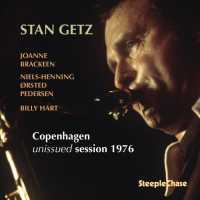








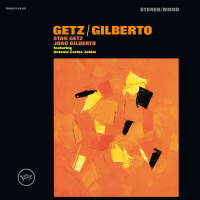
























































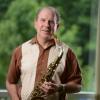



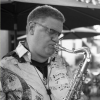






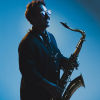

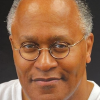

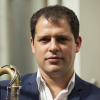


















.jpg)
















